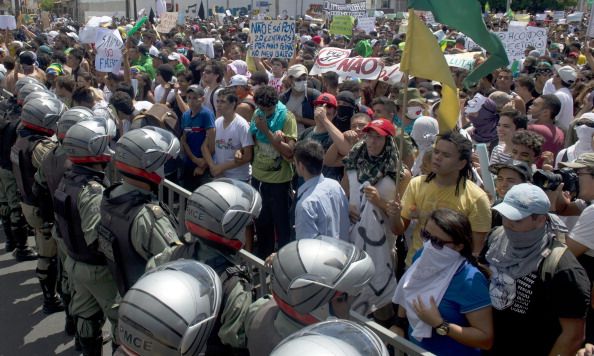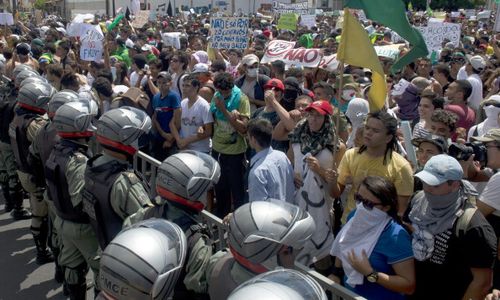
Brazil fare hikes rolled back but protesters, police clash

Protesters demonstrate as a group clashes with the riot police while trying to block access to the Castelao Stadium in Fortaleza, where Brazil is to play Mexico in a FIFA Confederations Cup Brazil 2013 football match, to denounce the events’ $15 billion price-tag, on June 19, 2013. (AFP/Getty Images)
Protesters battled police late Wednesday near Rio de Janeiro, even after Brazil’s two biggest cities rolled back the transit fare hikes that triggered two weeks of nationwide protests.
The fare rollback in Sao Paulo and Rio de Janeiro marked a major victory for the protests, which are the biggest Brazil has seen in two decades and have evoked comparisons with the Arab Spring and the unrest in Turkey.
The demos were triggered by the rate hikes, but have swelled with fury at the government’s lavish spending on the Confederations Cup, next year’s World Cup, and the 2016 Summer Olympics, which critics say comes at the expense of social programs.
The fare rollback, which enters into effect on Monday, was not enough to placate all protesters: riot police equipped with body armor fired tear gas to break up a mob of several hundred that tried to block a 15-kilometer bridge across the Guanabara Bay that links Rio with the nearby city of Niteroi.
The mob, which earlier ransacked a bank branch, knocked over an empty bus, then built barricades with wood debris and set it on fire, an AFP photographer reported.
The violent protesters peeled off from an otherwise peaceful protest march of some 7,000 people in Niteroi. Thousands of people also marched peacefully in cities including Belo Horizonte, Sao Paulo, and Rio Branco, in Brazil’s Amazon region.
However in the northeastern city of Fortaleza, where Brazil beat Mexico 2-0 in their second Confederations Cup match, some of the roughly 10,000 protesters hurled stones at security forces, who responded with tear gas and rubber bullets.
“Forward, forward,” the demonstrators shouted as police blocked access to the $240 million Castelao stadium. An indignant woman declared “this is a dictatorship” as police fired rubber bullets.
Several foreign football fans were trapped by the protesters. “To Brazil — never more,” said Joaquin Diaz, a 42-year-old Mexican who was in town to support his national team.
“Forget the World Cup, I’m returning to my country tomorrow,” Diaz told AFP.
The protesters, including many young people who feel left behind by Brazil’s rapid economic growth, have accused the government of neglecting health and education while pouring millions into sports stadiums.
The government has earmarked $15 billion for the Confederations Cup and the 2014 World Cup, two events aimed at showcasing Brazil’s recent economic boom and rising global stature.
Sao Paulo State Governor Geraldo Alckmin on Wednesday said that subway, train and bus fares would revert to $1.35 from $1.44 at the current exchange rate, while Rio Mayor Eduardo Paes said bus fares would go back to $1.24 from $1.33.
Several other Brazilian cities, including Porto Alegre and Recife, had already canceled their own fare hikes.
The fare increases may appear modest, but are a major burden for thousands in a country where the minimum monthly wage is currently only $306.
The current wave of unrest began nearly two weeks ago in Sao Paulo and rapidly spread to other cities just as the country on Saturday kicked off the Confederations Cup, a dry run for next year’s World Cup.
The justice ministry had ordered a crack federal police unit to deploy in five Confederations Cup host stadiums located in the states of Rio de Janeiro, Bahia, Minas Gerais, Ceara as well as in the federal district of Brasilia.
In Fortaleza, a city of 3.5 million where 6,000 additional state police troopers were deployed, protesters railed against the country’s political class, accusing it of corruption and mismanagement.
“We are protesting the use of public funds for the construction of stadiums, money that should be used for education,” said 18-year-old Matheus Dantas, amid a sea of Brazilian flags.
“Brazil, we are going to wake up — a professor is worth more than Neymar,” the demonstrators in Fortaleza shouted, referring to Brazil’s young national team football superstar.
Ahead of the match against Mexico, Neymar joined his Selecao teammates in backing the escalating social protests, and chided President Dilma Rousseff’s government for failing to deliver adequate social services.
“Saddened by all that is occurring in Brazil,” Neymar said in a statement.
“I always had faith that it would not be necessary to come to the point of having to take to the streets to demand better conditions for transport, health, education and security,” he said.
On Tuesday, at least 50,000 people flooded the streets of Sao Paulo, Brazil’s most populous city and the nation’s industrial capital, to vent their anger at the country’s politicians, including Rousseff.